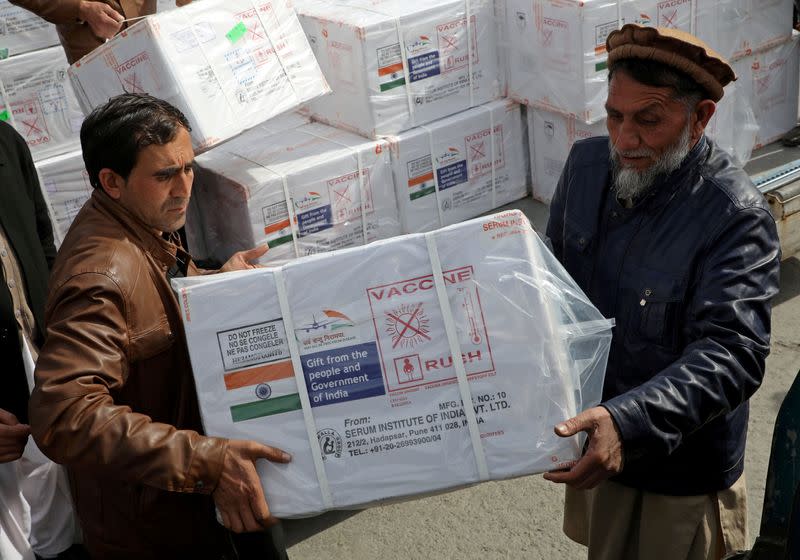By Sanjeev Miglani
NEW DELHI (Reuters) – India has approved the shipment of the COVID-19 vaccine to Cambodia and plans to supply Mongolia and Pacific Island states, officials said on Sunday when supplies arrived in Afghanistan – all part of the growing diplomacy in vaccines in the country.
Seeking to steal a march on rival Asian giant China, which has also promised to deliver vaccines, Prime Minister Narendra Modi’s government has given neighboring countries millions of doses of the AstraZeneca PLC vaccine made locally, even when its domestic immunization program has just begun.
Modi is using India’s strength as the world’s largest manufacturer of vaccines for various diseases to improve regional ties and resist China’s political and economic dominance.
New Delhi urgently approved 100,000 doses for Cambodia, following a request to Modi by Cambodian Prime Minister Hun Sen, India’s envoy told Phnom Penh.
Cambodia is an important ally of China, which is expected to supply one million doses of COVID-19 vaccines, developed mainly by state-owned Sinopharm.
“Supply was guaranteed through the Serum Institute of India, despite numerous competing orders from partner countries and our commitment to our domestic population,” said Ambassador Devyani Khobragade.
India has given doses to Myanmar, Bangladesh, Nepal, Sri Lanka and Maldives to help them start working with frontline workers as part of their Friendship Vaccine initiative.
On Sunday, it sent 500,000 doses of the AstraZeneca vaccine to Afghanistan, the first to reach the war-torn country, which is still awaiting emergency approval from the World Health Organization to administer them.
India has invested millions of dollars in Afghanistan over the years, in an expansive effort seen as a setback against the influence of archrival Pakistan in the country. “Vaccines are being provided on the basis of donations,” said a government source.
So far, India has provided 15.6 million doses of the vaccine to 17 countries through donations or commercial contracts, said Foreign Ministry spokesman Anurag Srivastava.
Shipments will be sent to Mongolia, Caribbean countries and Pacific island states in the coming weeks, he said. “External supply is an ongoing process, depending on availability and domestic need,” he said.
India, which has the second highest number of coronavirus cases in the world, plans to immunize 300 million people by August. He vaccinated about 3 million health workers in the first two weeks of the campaign, which started on January 16, and will need to accelerate the pace to meet the summer goal.
(Reporting by Sanjeev Miglani; Editing by William Mallard)
